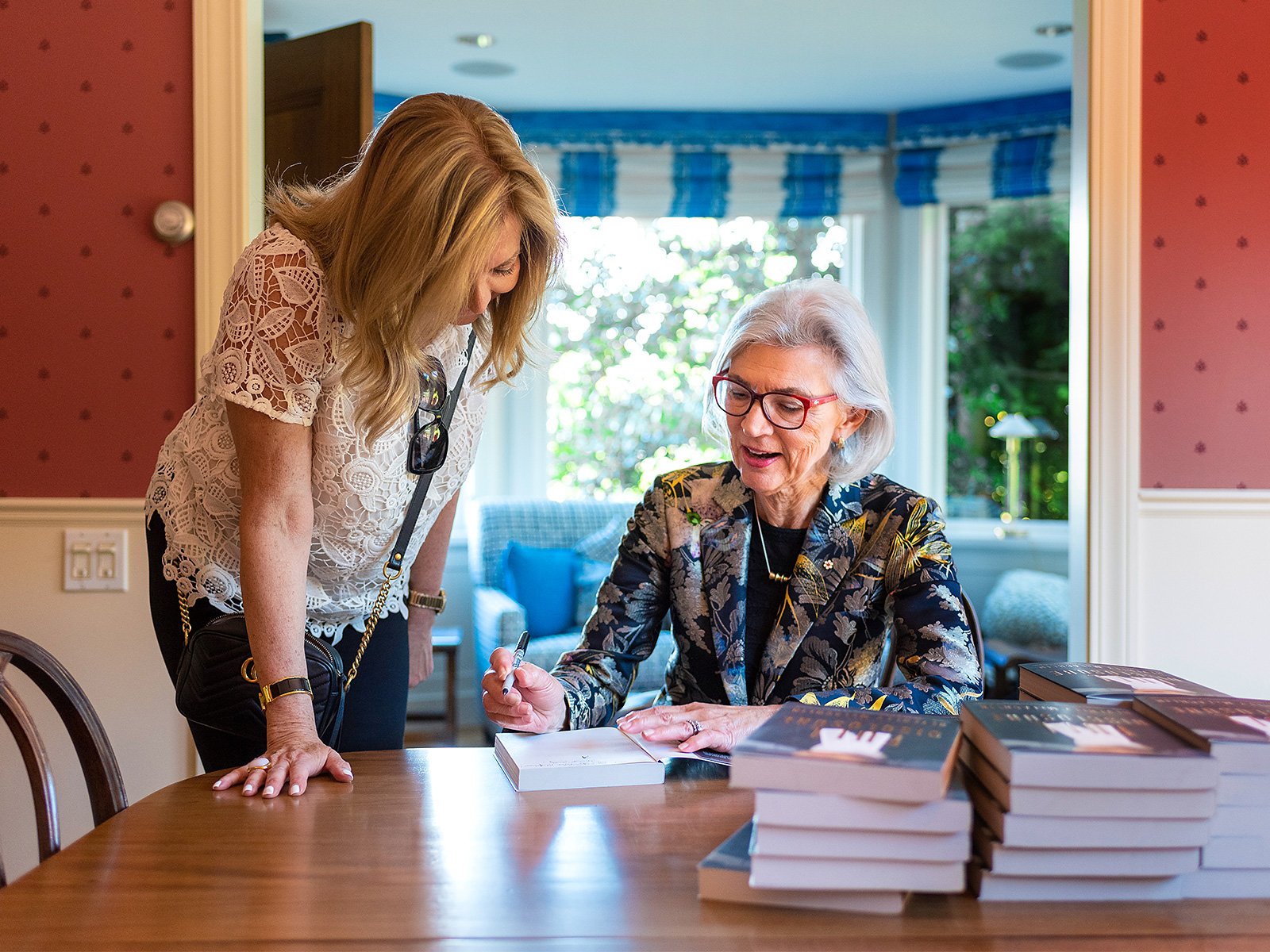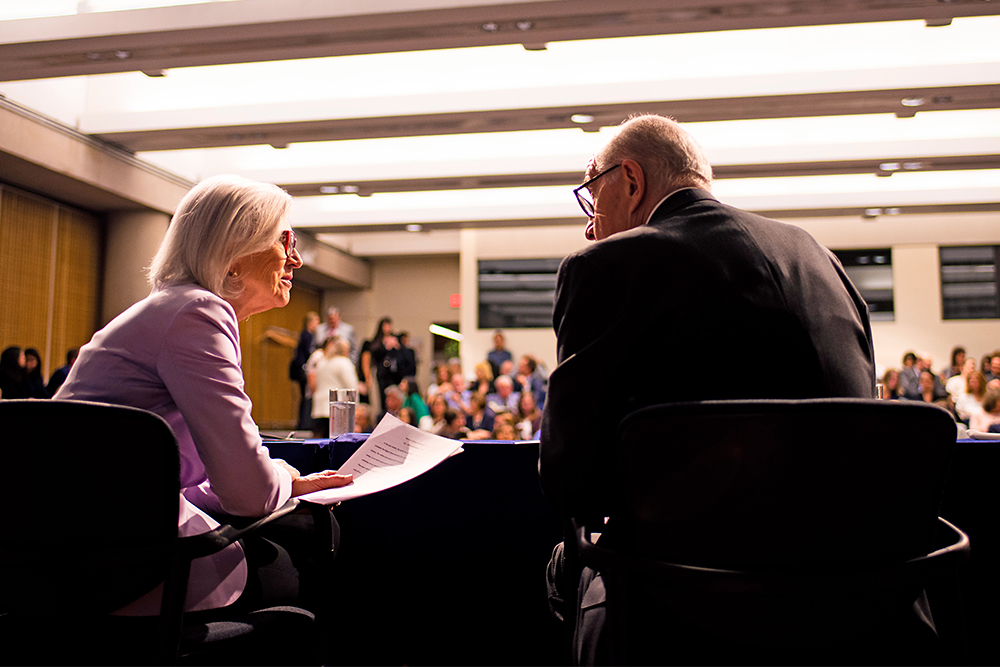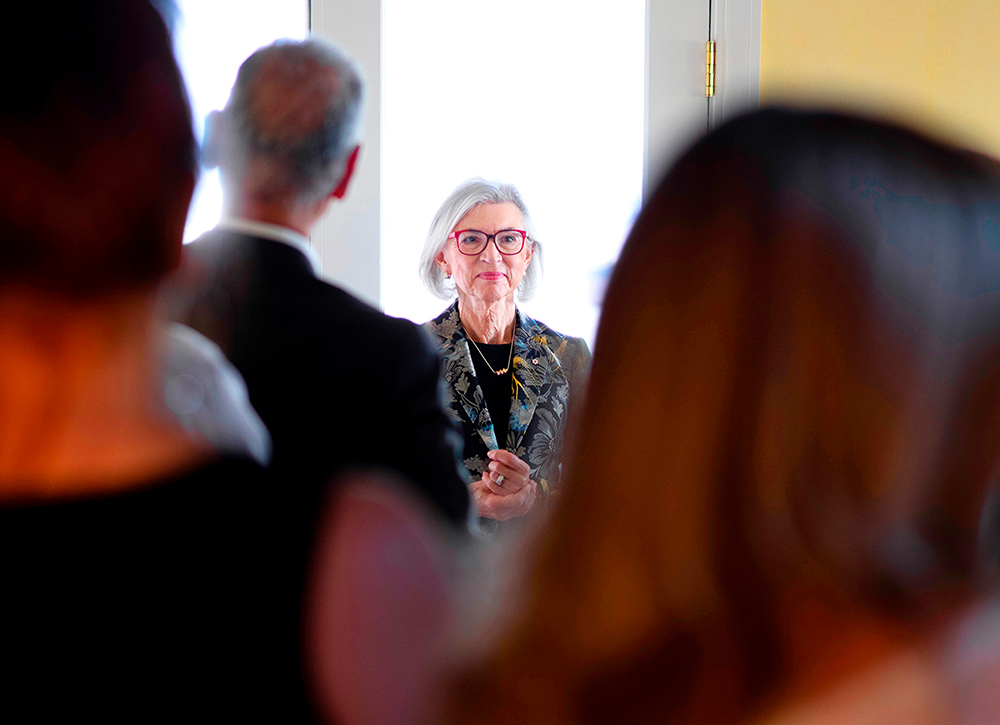Interviewing former chief justice Beverley McLachlin is not for the faint of heart.
She is widely regarded as one of the greatest legal minds ever to come out of Canada. Her tenure at the Supreme Court of Canada, particularly as its chief justice (the first woman ever to hold the post), is generally viewed not only as the high-water mark of Canadian jurisprudence but also as an example of judicial excellence much of the world seeks to emulate. Her decisions and writings on dozens upon dozens of intellectually intricate and ethically thorny issues are models of clarity and precision.
The impact on the lives of Canadians has been incalculable. Not only has Beverley McLachlin, '65 BA, '68 LLB, '68 MA, '91 LLD (Honorary), weighed in with fairness and precision on such issues as the right of prisoners to vote, Indigenous land claims, systemic discrimination against women, safe injection sites, assisted dying, hate speech, and free and fair electoral practices, but she has done it while fostering an open and collegial environment on the Supreme Court.
McLachlin's retirement from the bench in 2017 - after 28 years on the Supreme Court and 17 years leading it, the longest run ever for a chief justice - elicited an outpouring of praise, respect and admiration. The high regard with which she was, and still is, held has since been reinforced by her being named to the Hong Kong Court of Final Appeal and appointed to review allegations of misspending by two officials in the B.C. legislature. She had a few other surprises up the arm of her robe, too. Shortly after retiring, she produced a legal thriller, Full Disclosure, which immediately shot to the top of the bestseller lists and discussions are underway for a screen treatment. (More about the book later.) Her memoir, Truth Be Told: My Journey Through Life and the Law , is due to be released this fall.
In short, McLachlin is - and there is no fear of exaggeration - one of the most truly impressive people this country has ever produced.
When interviewing such a person, a journalist frequently looks for, or at least remains alive to, flaws to offset the subject's outward-facing impressiveness (if for no other reason than to hang on to a shred of one's self-worth). But there is no such recourse with McLachlin because as impressive as she is intellectually, she seems equally kind and gentle in person. And genuine. And polite. And self-deprecating. One can only come away feeling that one's own life path, no matter how unswerving and ambitious it may have seemed, is but a weedy backwoods trail full of soggy maps, aimless backtracking, popped blisters and roots tripped over, and which, in the end, hasn't led anywhere particularly interesting … but this is not about me.
Born in 1943, McLachlin grew up in southern Alberta, near Pincher Creek, the eldest of five children. Her father, Ernest, was a rancher and farmer and also ran a sawmill. Her mother, Eleanora, ran the household and helped with her husband's various business ventures. McLachlin describes her upbringing as not affluent but says her parents always had enough to feed and clothe their children. Though that didn't prevent economic anxiety.
"There was always a sense of, 'Will there be enough money to pay the bills? To pay all the people we have to pay at the end of the month?' It was a rural community and nobody was wealthy. It wasn't a class community in that sense, and so I never had any sense of entitlement at all."
Her parents encouraged her academic ambitions during an era that was less than welcoming to women in the white-collar professions. McLachlin knew she wanted to go to a university of good standing when she finished high school.
"The U of A was always something of an icon," she says. "But there was also a practical reason. I didn't have any money and my parents had four children younger than me, so there was no way that they had the luxury to say, 'Would you like to go to UBC or the University of Toronto?' But I never wanted to, either, because everything I knew about the University of Alberta was that it was a very fine institution. And indeed, it was and still is."
Once she finished her undergrad degree, McLachlin went on to complete a master's in philosophy and a law degree at the U of A - graduating with both, remarkably, in the same year. By then she had married her first husband, Rory McLachlin, '70 MSc. He was supportive of her career and urged her to take it as far as she could. "He always told me, 'You'll be on the Supreme Court one day.' I would laugh at him." (Tragically, he died of cancer at age 47.)
The study of law resonated deeply and immediately with her. It suited her intellectual interests - exploring ideas, developing positions, arguing for certain stances - and it was also about people. It seemed to her a good avenue to engage with society in a direct way.
Law was still mainly the domain of men. There were 65 students in her class at the law school, seven of whom were women, four of whom went on to legal careers. Sexism was a mountain that a woman in a professional field had to climb every single day.
"It was just the way the world was," McLachlin says. "It's changed a lot, thank goodness. But I remember when I went for my first interview for articles, and it was with a prominent practitioner, a wonderful man. We had a great interview and I was the top of the class. I thought I'd get the job. At the end of this lovely interview, he said, 'Why do you want to practise law?' I was completely flummoxed and didn't know what to say. Seeing my discomfiture, he said, 'Well, you know, you're married!' I thought, 'What does that have to do with it?' I remember just fleeing the office and feeling, 'I'm not going work there, even if they were to ask me.' They never did. But I went across the hall and got a job with a different firm that had had women working for them."
She was soon to discover the depth of sexism that existed, even once a woman had secured a job and established her bona fides. The sexual banter, the casual disrespect. The day she started with the new law firm, she was put in an office with another female lawyer; none of the male lawyers shared offices. It wasn't that people were unkind, she recalls, but there was an entire set of working assumptions taken for granted.
"I even remember times you'd finish a case and the firm would have a victory lunch at a men's-only club! I fumed and in the end just said to them, 'I'm hurt, you shouldn't have done that, and that was wrong.' … Basically, I decided that if things happened, well, that was the other person's problem and I wasn't going to let it get me down. I always had a certain doggedness and determination that I would not let that kind of thing get in my way. I'm a pragmatic person. Sometimes you have to stand up, but do it honestly and politely. That has always been my approach and I think it has served me well."
She would go on to bring about many changes in the workplace. An observer will no doubt wonder whether her early experiences of discrimination etched into her a passion for fighting for the powerless. "The greatest satisfaction I got out of the early years of my practice," she says, "were those cases where I took on somebody who didn't seem to have a hope. You knew they were in a bad situation, and I found some small role to play in rectifying their situation or getting them justice. I found that enormously satisfying."
McLachlin worked as a lawyer in Edmonton and British Columbia, then as a professor at UBC, before taking on various judge positions up the chain until she was appointed in 1988 as chief justice of the Supreme Court of British Columbia. When former prime minister Brian Mulroney appointed her to the Supreme Court of Canada in 1989, she found almost instantly that it suited her intellectually and temperamentally. The 70‑hour workweeks weren't a problem. "When you're involved with what you're doing, it's fine. The most important thing is not how much you're working but that you love what you're doing and that you're involved with what you're doing."
Yet the stress of the Supreme Court is real and relentless. Again, McLachlin's temperament helped set the tone. "I've always felt in my soul that it's right to achieve as much consensus as possible. I mean, I will never resile from what I feel is the right position, so someone else would probably say, 'She is pretty confrontational.' And I've written my share of dissents. But there's a high level of collegiality. During my time on the court, I was privileged to serve with wonderful people. We had a lot of good times and great discussions. It's fun. When you're working that closely with people, you develop intense bonds."
It might be difficult to understand how two judges can argue a point of law vociferously in the afternoon and then have an enjoyable meal together in the evening. Professional differences, she says, are part of the work. It doesn't mean you don't respect one another. You have to be true to your vision of the law and what the result should be, and if you're not true to that, you're not doing your job. Which means no matter how much you respect your colleagues, there are going to be confrontations. But she led the way in creating an environment of respect for opinions, ideas and shared humanity.
"At the basis of all her decisions is compassion," says legal scholar Ian Greene, '70 BA(Hons), who is co-writing a book with Peter McCormick, '68 BA(Hons), called Beverley McLachlin: The Legacy of a Supreme Court Chief Justice , due out this fall. "She has been arguably one of the most effective judges the court has had in terms of the advancement of the rule of law and human rights, clarity of writing, leadership and the promotion of collegiality."
One has to wonder how a person can retain the mental and emotional strength, not to mention the physical stamina, to do a job like that day after day, year after year. McLachlin admits she had to remain constantly aware of managing the stress, as every judge does. Most find ways to sublimate the strain, to bleed off the pressure with outside interests. She recalls the advice of former Supreme Court justice William McIntyre. When she replaced him, she asked if there was one piece of advice he could give her. He thought about it for a while and then said, "Find outside interests. Otherwise this job will consume you."
"It was wonderful advice," McLachlin says. "I had a young son at the time. And Frank [McArdle, her second husband, to whom she has been married for 27 years] and I have a cottage we get away to. I walk a lot. I turn off my electronics for a day or two. I go to concerts. I see friends outside the legal profession. You need to stay connected, to read the papers, to be involved with society. You have to be part of the community to understand the community. I was appointed in 1989 and left the court in 2017, and there's no way I could have survived that period so happily if I hadn't had a good human life."




We at New Trail welcome your comments. Robust debate and criticism are encouraged, provided it is respectful. We reserve the right to reject comments, images or links that attack ethnicity, nationality, religion, gender or sexual orientation; that include offensive language, threats, spam; are fraudulent or defamatory; infringe on copyright or trademarks; and that just generally aren’t very nice. Discussion is monitored and violation of these guidelines will result in comments being disabled.